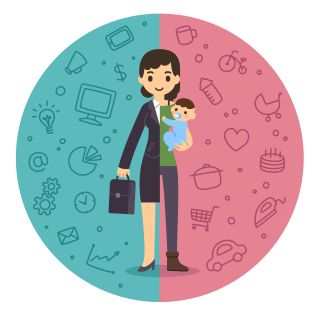Autism
What Is It Like to Be an Autistic Mother?
A Personal Perspective: The experience of being an autistic mother.
Posted March 27, 2024 Reviewed by Lybi Ma

I am an autistic woman and a mother. If you google autism and mothers, you will find thousands of articles written about and for women who are trying to parent autistic children. You will find a landslide of research and studies discussing how neurotypical mothers can best cope with autistic children. Yet there is little out there for autistic women embarking on the journey of motherhood.
"Knowledge of how motherhood is experienced by autistic women is currently poor," according to Dugdale, Thompson, and Freeth (2021). According to Hampton and colleagues, there is very little research on how autistic women relate to motherhood (2022).
There is little more challenging in life than being a mother. No matter who you are or where you are, this will be one of the biggest challenges of your life. Children defy all expectations. Childbirth is painful and difficult. Babies don't sleep, and they cry and push any woman's capacity to the edge of their abilities. Motherhood also brings the greatest joys that are possible in life.
I have spent a lot of time writing and writing about what it means to be an autistic adult and what it means to be an autistic woman but until this week I never thought much about how that applied to me being a parent. I have three sons—21, 22, and 12. I also have two stepchildren—8-year-old twins. Parenting has been and is a huge part of my life. Yesterday, I was told that another group within my area blacklisted my therapy practice and me because I took phone calls in session and got up and left sessions. This is always due to a very sick child. Within short order, I overheard a conversation between two people discussing how unreliable I was with tasks in my practice and how I used my autism and my children as an excuse. I have been described as flaky for lacking the ability to balance motherhood and work. This made me wonder. Is this my failing as an autistic mother or is this just the challenge of being a mother in general?
I have been a good mother, but I feel incapable of putting anything before my children. As my older sons have grown, this has become an irritant for them, but when my boys were little this was a gift. I stayed up all night planning birthday parties and trips, and designing costumes. I wrote a book based on the game my older sons and I played, called “The Monster Hunter’s Manual.” My sons have been my entire world and that has led to many other problems in my life as being a mother has become my most all-consuming hyperfixation. I think for many autistic mothers this is the norm. I watch my sister, who is also autistic, with her daughter and her dedication and passion for being a perfect mother pushes her to the breaking point. Dugdale, Thompson, and Freeth (2021) found that autistic women experience being a mother with intense love and connections. Hampton and colleagues found that autistic mothers struggle but have an intense connection with their children (2022). But, it seems, this is just what it is to be a mother.
Motherhood Is Humanizing
Ultimately, being a mother is the single most humanizing part of my life. I have never felt like I belonged anywhere. Every human interaction I have ever had has felt fragile. I always feel hated and that I am a constant irritant. This is what it is to be autistic. It is being the irritating outsider who struggles to belong. I have to mask myself in front of almost everyone. I always feel like everyone will leave when they realize how weird I am beneath the mask. I have always felt like I couldn’t have normal conversations with anyone.
Motherhood has been the single thing that has changed this feeling for me. When I had children, I had humans who instantly loved me, and my sons loved me deeply despite all my flaws. I have been able to love my children completely and freely because the constant masking and fear are gone. My boys have always loved me for who I am and that has liberated me to love them back without fear or anxiety and pushes me to work to be the best mother I can.
Motherhood has also given me a link to the rest of humanity. I have learned that I can sit with any mother and talk about my children, and I can suddenly relate to other neurotypical mothers and parents. Most humans love their children and struggle to build the best lives they can for them. Despite my autism and my weirdness, the gift of motherhood has made me more normal and made me feel like I belong.
Even though motherhood is a struggle for me as an autistic woman, I know it is a struggle for all women. I also know it is a gift for all women and in this, I am connected to all other women and to all other people who have been a parent more than I am separated from them. I think that being a mother is the most normal thing I have ever done and that it has made me feel more normal, more human, and less like a weirdo than any human interaction-based experience in my life.
Hampton colleagues (2022) said, "Professionals working with autistic parents should be aware that autistic and non-autistic parents report being equally likely to engage in positive parenting behaviours such as nurturance and involvement." Autistic women are mothers, like all others, and in this we are normal.
References
Sarah Hampton , Carrie Allison , Ezra Aydin , Simon Baron-Cohen* and Rosemary Holt (2022). Autistic mothers’ perinatal well-being and parenting styles. Autism 2022, Vol. 26(7) 1805–1820
Dugdale, A.-S., Thompson, A. R., Leedham, A., Beail, N., & Freeth, M. (2021). Intense connection and love: The experiences of autistic mothers. Autism, 25(7), 1973-1984. https://doi.org/10.1177/13623613211005987


